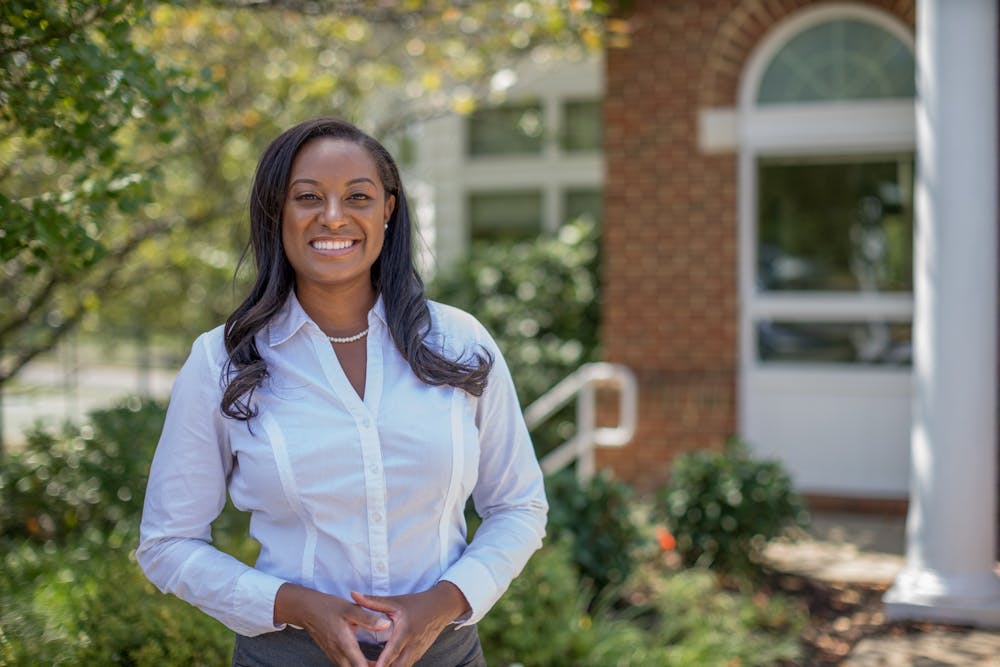Former delegate Jennifer Carroll Foy, a candidate for the Democratic nomination for governor, hosted a virtual roundtable with Charlottesville small business owners Tuesday evening. During the event, Carroll Foy discussed her plans to safely reopen Virginia’s economy and promote small businesses.
In 2017, Carroll Foy was elected to the Virginia House of Delegates to represent Virginia’s Second District, which covers parts of Prince William and Stafford counties. She stepped down in December to focus on her gubernatorial campaign, which she announced in May.
In an interview with The Cavalier Daily, Carroll Foy said the election of former president Donald Trump and the rhetoric he spread was the primary reason she ran for office in 2017.
“We needed someone who was going to be a voice to support all Virginians and to ensure that we weren't just surviving but thriving, and that [led to] my decision for running for delegate,” Carroll Foy said. “That continues to lend as a motivating factor for me running for governor.”
For Carroll Foy, the first step towards safely reopening local economies — and in the case of Charlottesville, the universities those economies are closely involved with — is depoliticizing mask-wearing.
“It’s not a political statement — it is simply a matter of life and death,” Carroll Foy said. “We have to do better at our messaging and promoting that.”
During the roundtable event with Charlottesville small business owners, Carroll Foy discussed her post-pandemic economic recovery plan, which she released Tuesday, and fielded questions from participants.
Carroll Foy’s plan outlines her goals of fixing the Commonwealth’s unemployment insurance system, promoting small, minority-owned and women-owned businesses and assembling a task force with Virginians most impacted by the pandemic to provide input on economic recovery.
“We have an opportunity now to build our economy back in a way where everyone gets to participate,” Carroll Foy said. “We [will] give businesses the tools that they need to not only reopen, but other businesses to scale up.”
Carroll Foy, who grew up in Petersburg, Va., said that she has witnessed firsthand what happens when businesses leave a community and its people don’t have access to economic development.
“We all know that this has been one of the most challenging times in Virginia's history,” Carroll Foy said. “Because [we are] Virginians, we are resourceful and resilient. I am confident that we're going to be able to navigate successfully and build a successful post-COVID economy.”
Carroll Foy said that she believes in a “bottom-up” approach towards reopening involving people who have been most impacted by the pandemic, who can then bring equity to a post-pandemic economy.
“Unlike policy platforms released by politicians of the past, my plan rejects the false choice that an economic plan of this time must be either pro-business or pro-worker,” Carroll Foy said. “My plan is both.”
In particular, Carroll Foy said she would focus on small, women-owned and minority-owned businesses. As governor, she said she would push for tax credits for small businesses to purchase personal protective equipment and would increase the amount of discretionary spending used by the Commonwealth to purchase goods and services from these groups.
One roundtable participant asked Carroll Foy how she would support small business owners who have struggled to provide health insurance to employees throughout the pandemic. As governor, Carroll Foy said she would implement a reinsurance program that would have the Commonwealth buy down premiums to make them more affordable for small business owners.
In response to a discussion about how the responsibility of childcare has fallen disproportionately on women, Carroll Foy said that ensuring full-day early childhood education will be necessary to returning to a fully-operating economy and is one of her top priorities. According to Carroll Foy, that also makes vaccine distribution important since teachers and childcare workers can’t return to work until they have received the vaccine.
“People can't go back to work until we quickly and safely also reopen our schools,” Carroll Foy said. “Finding those types of ways that we can support these systems is really important.”
Another participant asked Carroll Foy about the promotion of vocational school to high school students, who often don’t consider these programs when debating post-graduate plans.
“One of my goals would be to ensure that our children do not have to take on hundreds of thousands of debt in order to find a good-paying job that pays family-sustaining wages,” Carroll Foy said. “Everyone doesn't want to — nor should they have to — go and get a four-year degree, and we need to give them options to not have to do that.”
Carroll Foy — who was part of the third class of women to graduate from the Virginia Military Institute — said that the promotion of these trade schools to public high school students is especially vital. She emphasized that arming high school counselors with information on these programs, which they can then promote to students, is an important first step.
If elected, Carroll Foy would become the first female governor of Virginia and the first Black female governor in the United States. Other candidates for the Democratic nomination include former governor Terry McAuliffe, state Sen. Jennifer McClellan, lieutenant governor Justin Fairfax and Delegate Lee Carter.
On the Republican side, state Sen. Amanda Chase — who was censured by the state legislature Wednesday following her praise of the insurrectionists who stormed the Capitol in early January — will compete for the party’s nomination against Delegate Kirk Cox, former speaker of the House of Delegates. Entrepreneur Pete Snyder and veteran Sergio de la Peña have also declared their candidacy for the Republican nomination.







